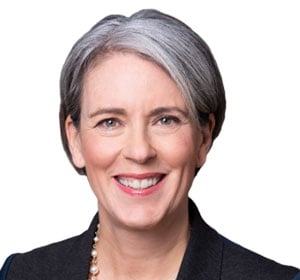
Governance Surveys

Creating Healthy Societies and Transforming People Risk in the Post-pandemic Workplace
As COVID-19 and its variants continue to disrupt society, business, and commerce, boards have expanded the scope of their risk oversight to include a broader, “people risks” agenda.
Directors responded swiftly to the pandemic, supporting management teams as they faced new challenges to the health and well-being of their workforces. At the same time, there is a rising awareness of the role organizations play in addressing societal concerns at the board level. The intersection of these two issues is where the notion of creating “healthy societies” emerges.
The creation of a healthy society incorporates equitable access to affordable, quality health care, providing healthy environments to live and work in, and creating financial security and a more equitable workforce across race, ethnicity, and gender. These aspects all play a role in our collective and individual health outcomes.
Boards that take on managing these “people risks” with the right balance of empathy and economics will be better positioned to secure the organizations’ future during this accelerated period of sustained change.
The Expanded Role of Employers in Supporting Wellness
Before the pandemic, organizations and their boards framed the relationship with their employees through the lens of the workplace environment. Policies were created to help guide the organization and its employees in conducting the work relationship. Organizations often developed benefits, compensation, hiring, and workplace procedures from this perspective.
In just a few months in 2020, the pandemic shifted this paradigm. As many organizations went to remote work arrangements, the line between what happens inside the workplace and outside the workplace dissolved. This shift created a new level of oversight for boards as organizations needed to quickly develop strategic approaches to ensure the health and safety of their employees inside and outside of the workplace.
Boards Take on New Challenges
As boards continue to tackle the ongoing issues related to COVID-19 and its variants, health becomes a new driver in charting the future of an organization. The concept of “healthy societies” offers a means to create a sustainable organizational culture that benefits people, the organization, and the communities in which the organization operates.
The healthy societies concept advocates for the health and well-being of everyone through sustainable means that protect people and the planet. This means providing a safe, professional, and personal work environment that enhances an employee’s well-being, both physical and emotional.
Emotionally and physically healthy employees are better positioned to manage their work and home-life balance, leading to increased productivity. Long-term value can be achieved when organizations and boards take a healthy society approach to developing processes and procedures that impact employees with this shared vision for the future in mind.
Creating a Safe Work Environment for Today and Tomorrow
Providing employees with a safe working environment remains a top concern for most organizations. Changes to the physical design of workspaces, plus the use of masks, sanitizers, physical distancing, temperature checks, testing, and other safety measures, are now almost normalized in the physical workplace. These changes give employees who need to be physically present to perform their jobs the confidence that they are protected. A consistent and sustained safety policy will help make the transition from the home office less stressful for those returning to the workplace.
But a larger question remains for boards and management to now consider: when we emerge from the pandemic, will organizations try to revert to pre-pandemic “business as usual,” or will they create new operating models to ensure flexibility and agility in response to future outbreaks or other disruptions? Boards that advocate for contingency planning that factors in the health and safety of those in the workplace will enable companies to swiftly pivot and maintain productivity in the face of unforeseen circumstances.
Understanding the Emotional Well-being of Employees
The health and safety of employees goes beyond the physical workplace. According to the American Psychological Association, a mental health crisis has emerged as instances of stress, anxiety, and depression are on the rise. This can lead to lower levels of employee well-being and productivity, as well as increased organizational costs. Now, as many companies are asking employees to return to the workplace, new mental health stressors have emerged, as many are reluctant to leave their home offices.
Boards that respond with empathy and take into consideration the mind-set and needs of employees will be better positioned to support leadership in managing this situation. “This was a very human crisis, and that’s a different dimension compared to most business or financial risks,” noted one director who commented on this topic for this article. “Boards had to become more people-focused than they have ever been before.”
Organizations are already responding to the pandemic-related mental health crisis among employees. In the 2020-2021 Global Talent Trends Study by Mercer, 45 percent of US human resources executives reported adding benefits to address mental and emotional health issues. A continued focus on employee well-being will take time and resources, and conversations at the board level about these critical issues will help keep the needs of employees front and center as new policies are proposed.
Reshaping the Paradigm for Talent Acquisition
Talent acquisition and retention continues to be a top challenge facing organizations, according to Mercer’s survey of human resources professionals and risk managers. That challenge is not only finding the right talent to fill the positions, but also creating a diverse organization that works together to contribute to the overall health of our society and contributes to an employee’s sense of inclusion and belonging.
Society and employee populations, especially younger generations, are more culturally aware and awakened in an era of #MeToo, George Floyd, and Greta Thunberg. While the immediate global health crisis took precedence over sexual harassment, systemic racism, and climate change concerns in many ways, they remain at the forefront for leadership and employees. In a tight labor market, employees want to have a strong connection to purposeful organizations that demonstrate strong environmental, social, and governance (ESG) values, and they are more likely to stay at and be more productive for these kinds of employers.
In addition, new technologies, changing demographics, and the pandemic are creating other challenges for employees as they seek not only to find satisfying work but also to work in a manner that contributes to their well-being. This changing nature of work also requires new considerations for talent management. For example, boards should be aware of the legal and operational issues associated with flexible working, gig workers, and technology adoption. As more of the workforce opts into flexible working arrangements, organizations will need to examine investing in digital technology and designing work experiences and benefits that demonstrate a deep understanding of the needs of their people. These topics belong at the board table, as directors can support talent development that leads to healthy and sustained organizational growth.
Raising the Bar for ESG
ESG issues have taken on new meaning in the last ten years and efforts have accelerated globally over the past 18 months. Disparities made more visible during the pandemic triggered new levels of thinking and a sense of urgency to build more inclusive and sustainable economies. Younger generations have chosen to align themselves with brands that demonstrate socially and environmentally conscious values. Climate change, diversity of thought, inclusiveness, wealth disparities, and more are no longer issues that live outside of the boardroom. Understanding the impact of the organization on social and environmental issues and guiding leadership toward sustainable and conscious solutions will go a long way toward building truly healthy societies.
Looking Ahead
After threatening public health and ushering in unprecedented disruptions, the COVID-19 pandemic has uprooted daily life and fundamentally transformed values for companies, employees, and society. Boards that adopt a people-first and healthy society mind-set can help leadership in developing sound strategies for the future. And that future begins with recognizing and embracing the expanded role employers can play in the health and well-being of employees inside and outside the workplace.

Martine Ferland is president and CEO of Mercer and vice chair of Marsh McLennan. She was named to the NACD Directorship 100 in 2021.